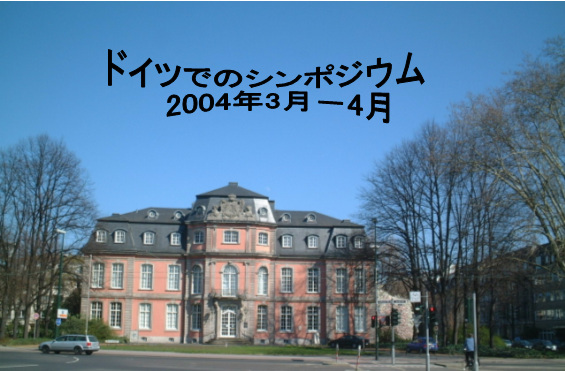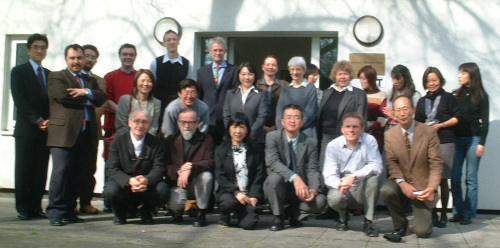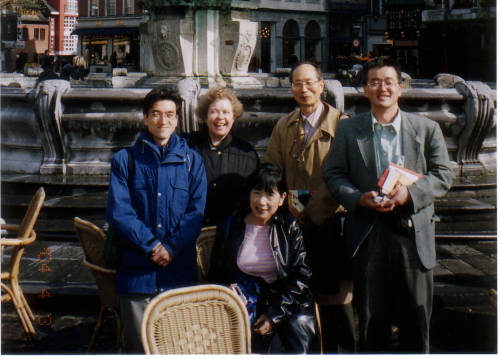「限られたメンバーによる、密度の濃いディスカッションを」、というシンポジウムは英語による日本語・日本社会への示唆に富む発表の連続であった。
Symposium: "Changing Language
Regimes in Globalizing Environments, Europe and Japan"
The forces of globalization make themselves
felt in many areas, established language regimes among them. Throughout large
parts of the world language regimes are changing or coming under pressure
to adjust to changing conditions. Research into changing language regimes,
therefore, has to adopt an interdisciplinary an international perspective.
Multilingualism is a complex phenomenon touching on various arenas of modern
society, notably culture and education, but also politics, social organization
and economy. In order to move beyond the established research paradigms dealing
with more or less stable situations of multilingualism, specialist of a
number of relevant fields will be brought together at the symposium. Western
European countries have experienced the effects of migration with the ensuing
phenomenon of increasing multilinguism earlier than Japan, and multilingualism
has received more attention on the part of the scientific community there
than in Japan. Accordingly, the work carried out in Europe over the past
30 years provides a valuable frame of reference for research into Japan's
incipient multilingualism. To what extent can Japan benefit from in-depth
analysis of the European experience? This is one of the focal questions to
be addressed by the symposium. In devoting attention to these questions we
expect to enhance our understanding of the forces and mechanisms leading
to changes of language regimes in Europe and Japan and come up with new perspectives
and insights on the study of such change. A close inspection of the peculiarities
of Japan's changing language regime is helpful in order to move beyond commonly
established notions about multilingualism that have so far primarily been
shaped by the Western experience.
Changing Language
Regimes in Globalizing Environments, Europe and Japan
Gerhard-Mercator-Haus
- Wednesday, March 31st
- Japan’s Multilingualism in
the Making
9:30-10:00
- • Introduction, Organization
- 10:00-12:00 (Chair: Fumio
Inoue)
- • John Maher (International
Christian University Tokyo):The principle of “cool” – designer multilingualism,
post-ethnicity and new multicultural forms
• Mary Goebel Noguchi (Ritsumeikan University Kyoto):Politics, the
media and Korean language acquisition in Japan
- 13:30-15:30 (Chair: Kiyoshi
Hara)
- •Peter Backhaus (University
Duisburg-Essen):Reading the city –signs of multilingualism in Tokyo
•Takao Katsuragi (Gakushuin University Tokyo):Three possibilities of
Japanese language policy –multilingualism, civic national language policy,
ethnic national language policy
- 16:00-17:00 (Chair: Takao Katsuragi)
- •Tomonori Taki (Nagasaki International
University):Labour migration and the language barrier in contemporary Japan
- Thursday, April 1st
The Western Experience as a Model for Japan: Fix or Fault?
9:30-11:30 (Chair: Florian Coulmas)
- •Kiyoshi Hara (Joshi Bijutsu
University Tokyo):The Japanese situation of language and dialects revitalization
and the Western experience
•Fumio Inoue (Tokyo University of Foreign Languages):Ecolinguistic
aspects of multilingual signs in Japan
- 13:00-15:00 (Chair: John Maher)
- •Kutlay Yagmur (Tilburg University):
Comparative perspectives on immigrant minority languages in
multicultural Europe
•Ayako Shikama (University Duisburg-Essen):Japan as the receiving end
of migration –attitudes in the host community
- 15:30-17:30 (Chair: Peter Nelde)
- •Florian Coulmas (University
Duisburg-Essen):Changing language regimes
•Christiane Hohenstein (Hamburg University):Interactional expectations
and linguistic knowledge in multilingual settings –the subliminal shaping
of L2 German by L1 Japanese in academic expert discourse
- Friday, April 2nd
New Horizons for Japanese as Foreign Language?
9:30-11:30 (Chair: Mary Goebel Noguchi)- •Mizue Sasaki (Musashino University):
Use of words on Japanese/Chinese/foreign origin in Modern Japanese
and human relationships
•Yuka Andō(University Duisburg-Essen):Japanese language instruction
and the question of „correctness”
- 13:00-15:00 (Chair: Jiri Neustupný)
- •Patrick Heinrich (University
Duisburg-Essen):How global can modern be? Language ideology in JFL textbooks
•Christian Galan (Toulouse University):To learn how to read and write
Japanese (kokugo &nihongo) –a (multi)linguistic barrier?
- 15:30-17:30 (Chair: Mizue Sasaki)
- •Tessa Carroll (Stirling University):
Beyond keigo –smooth communication and the expression of respect
in JFL
- Jiri Neustupný (Monash University
Melbourne):Foreigners and the Japanese in contact situations
|




